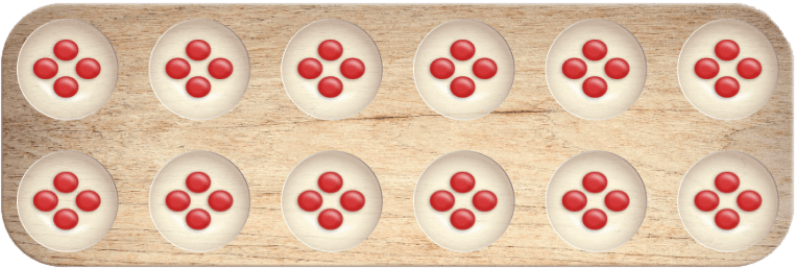Oware
Capture the most stones to win
Rules
Oware is an abstract strategy game among the bigger Mancala family of board games (or Pit and Pebbles Games) played all over the world with slight variations across different societies with regard to distribution area, number of players and strategy of play. It is played throughout West Africa and the Caribbean. Among its many names are Ayò (Yoruba), Awalé (Côte d’Ivoire), Wari (Mali), Ouri, Ouril or Uril (Cape Verde), Warri (Caribbean), Wali (Dagbani), Adji (Ewe), Nchọ (Igbo) and Awélé (Ga). A common name in English is Awari but one of the earliest Western scholars to study the game, R.S. Rattray, used the name Wari.
The game starts with 4 seeds in each house. The object of the game is to capture more seeds than one’s opponent. Since the game has only 48 seeds, capturing 25 is sufficient to accomplish this. Since there is an even number of seeds, it is possible for the game to end in a draw, where each player has captured 24.
Sowing
Players take turns moving the seeds. On a turn, a player can choose one of the 6 houses under their control (in front of them). The player picks up all of the seeds from that house and distributes them, dropping one in each house counter-clockwise from the initial house, this process is called sowing. The starting house is always left empty, if it contained 12 (or more) seeds, it is skipped, and the 12th seed is placed in the next house.
Capturing
In Oware, capturing occurs only when a player brings the count of an opponent's house to exactly two or three with the final seed they have sowed that turn. This always captures the seeds in the corresponding house, and possibly more: If the previous-to-last seed also brought an opponent's house to two or three, these are captured as well, and so on until a house does not contain two or three seeds, or does not belong to the opponent. However, if a player would capture all of an opponent's seeds, this is called a grand slam - which is explained below.
Grand slam
A grand slam is capturing all of an opponents' seeds in one turn. There are many variations to this rule; on PlayStrategy we use the following:
- Grand slam moves are allowed, however, they don't capture anything. This variation is commonly used in International competitions.
Let the opponent play
If an opponent's houses are all empty, the current player must make a move that gives the opponent seeds. If no such move is possible, the current player captures all seeds in their own territory, ending the game.
Winning
The game is over when one player has captured 25 or more seeds (win), or each player has taken 24 seeds (draw). As the game can end in an endless cycle, the engine can detect this situation (e.g. repeat of position) and will end the game automatically after the first repeat. When this happens, each player captures the remaining seeds on their side of the board, adding them to their final score and the player with the most seeds wins.
